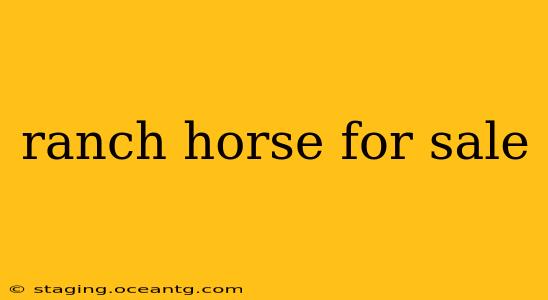Finding the right ranch horse is a significant undertaking. It's about more than just finding a mount; it's about finding a reliable partner capable of handling the demands of ranch work and offering years of loyal service. This comprehensive guide will help you navigate the process of finding a ranch horse for sale, addressing common questions and offering valuable insights to ensure you make the best decision.
What Makes a Good Ranch Horse?
A truly exceptional ranch horse possesses a unique blend of attributes. They aren't simply strong; they're intelligent, responsive, and possess exceptional stamina. Key qualities to look for include:
- Soundness: This is paramount. A horse with soundness issues will quickly become a liability on the ranch. Look for a horse with smooth, even gaits, and no visible lameness. A pre-purchase veterinary exam is essential.
- Temperament: A calm, willing disposition is crucial. A nervous or easily spooked horse can be dangerous in a working environment. Observe the horse's behavior in different situations to assess its temperament.
- Athleticism: Ranch work demands strength, agility, and endurance. The horse needs to be able to handle long hours in the saddle, navigate challenging terrain, and respond quickly to commands.
- Training: A well-trained ranch horse is invaluable. Look for a horse that is well-broke, responsive to cues, and comfortable with various ranch tasks.
- Breed: While many breeds excel at ranch work, certain breeds are known for their suitability. Quarter Horses, Appaloosas, and Paints are frequently chosen for their versatility, stamina, and calm temperament.
What Types of Ranch Horses are for Sale?
The market for ranch horses is diverse, encompassing horses suited for a variety of tasks and experience levels. You'll find:
- Started Horses: These horses have received basic training, making them suitable for riders with some experience. They are often more affordable than fully trained horses.
- Experienced Ranch Horses: These horses have a proven track record on a ranch, adept at handling cattle, and often possessing advanced skills like sorting and roping.
- Youth Horses: Gentle and well-trained horses suitable for younger riders, often possessing a calmer temperament.
- Reining Horses: While not exclusively ranch horses, many reining horses possess the athleticism, responsiveness, and cow sense essential for ranch work.
Where Can I Find Ranch Horses for Sale?
Several avenues exist for finding the perfect ranch horse:
- Online Classifieds: Websites and online marketplaces dedicated to equine sales often have a wide selection of ranch horses for sale.
- Local Auctions: Livestock auctions can offer a diverse range of horses, but thorough inspection is crucial.
- Breed-Specific Associations: Many breed associations maintain registries and may offer resources to help find horses within their breed.
- Ranch Owners: Contacting local ranches directly can lead to finding horses that are specifically trained for ranch work and may be selling off some of their herd.
- Dealers and Trainers: While some dealers can be reputable sources, careful vetting is essential. Reputable trainers may also sell horses from their training programs.
How Much Does a Ranch Horse Cost?
The price of a ranch horse varies greatly depending on age, training, experience, and breed. Expect to pay anywhere from a few thousand dollars for a younger, less-trained horse to tens of thousands for a highly trained and experienced animal. The overall condition and soundness of the horse will significantly influence pricing.
What Should I Look for in a Pre-Purchase Exam?
A thorough pre-purchase veterinary examination is non-negotiable. The vet should assess the horse's:
- Lungs: Checking for respiratory issues.
- Heart: Evaluating the horse's cardiovascular health.
- Legs and Feet: Identifying any lameness or soundness problems.
- Eyes and Teeth: Checking for dental issues and vision impairments.
- Overall Condition: Assessing the horse's general health and fitness.
What Questions Should I Ask the Seller?
Before committing to a purchase, thoroughly question the seller about:
- The horse's history: Including its age, training, and work experience.
- The horse's temperament: Getting a clear picture of its personality and suitability for your needs.
- Any known health issues: Transparency regarding past or present medical concerns is crucial.
- The horse's vices or quirks: Understanding any behavioral issues that might impact your experience.
Finding the perfect ranch horse requires patience, diligence, and a keen eye. By carefully considering the factors outlined above, you'll greatly increase your chances of finding a loyal partner that will serve you well for many years to come. Remember, investing time and effort in the search process will pay off handsomely in the long run.
